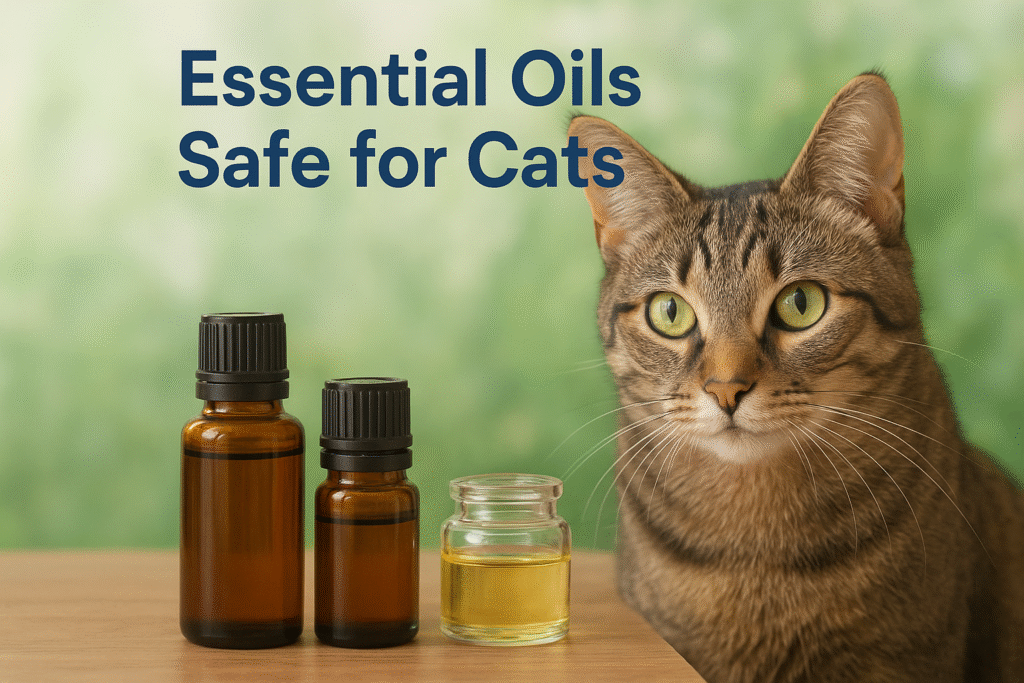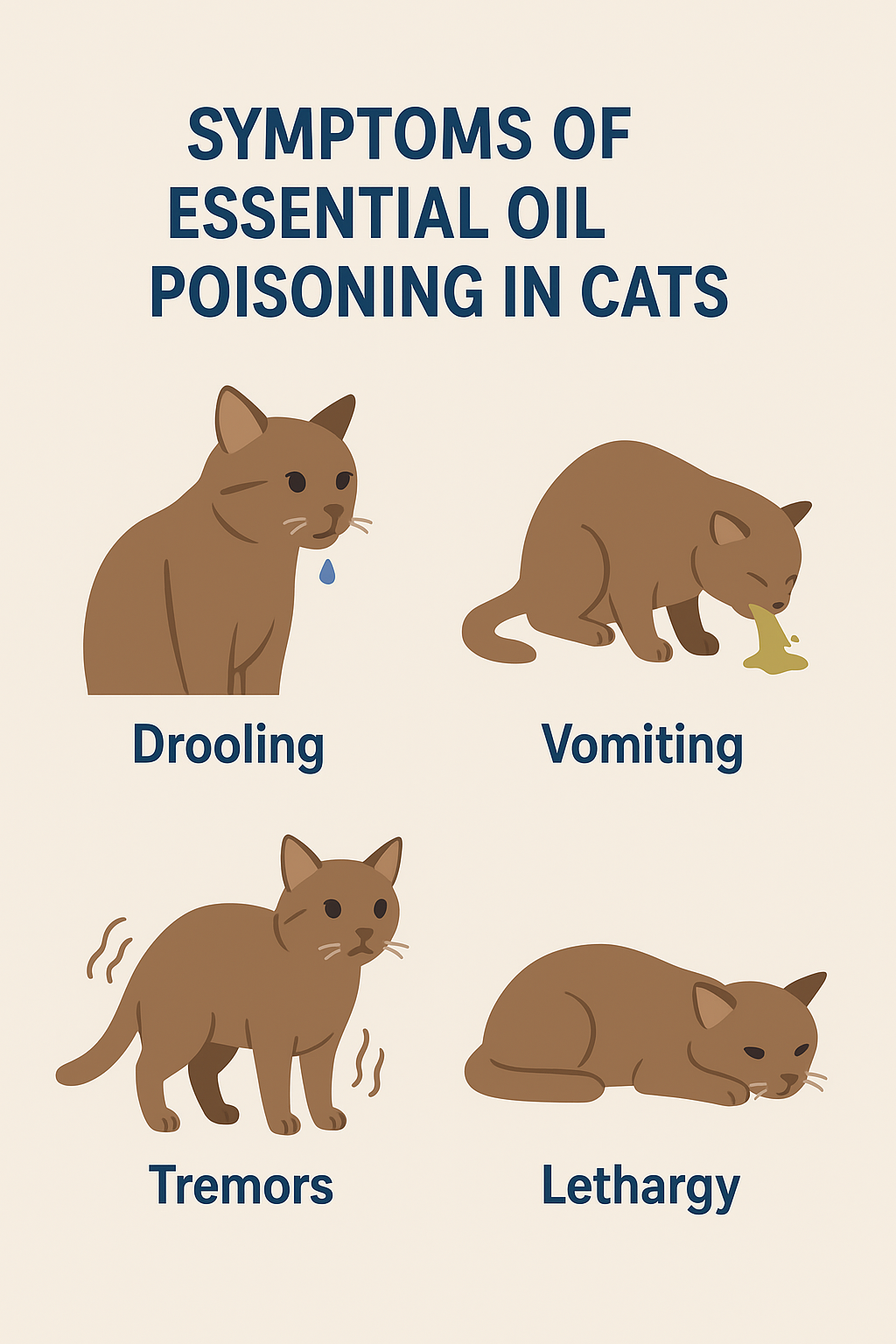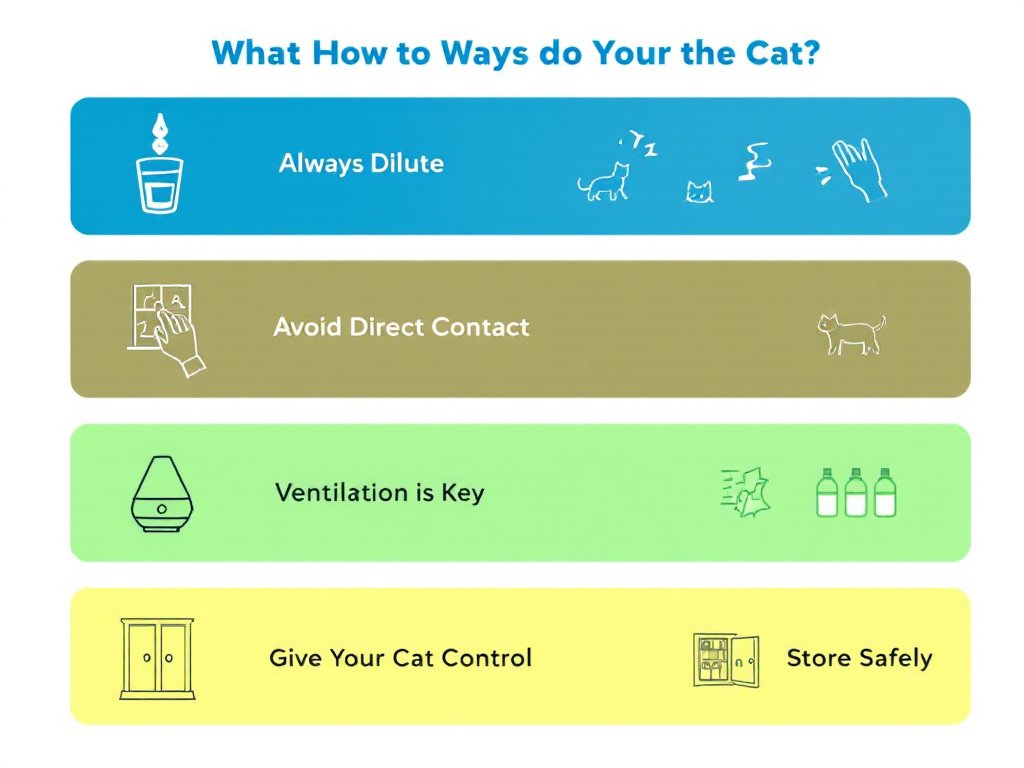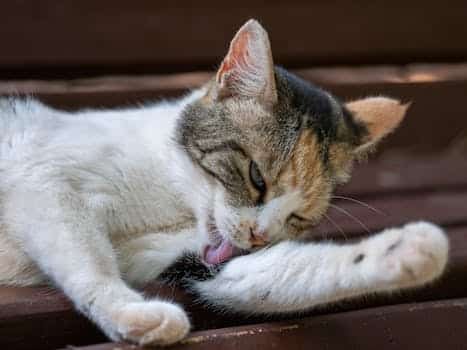Post Disclaimer
Catopedea shares information for educational and general interest purposes only. Our content is not a substitute for professional veterinary advice, diagnosis, or treatment. Always consult a licensed veterinarian for concerns about your cat’s health, diet, or behavior.
Introduction: Why Pet Parents Worry About Essential Oils

Essential oils have surged in popularity in recent years. These concentrated extracts from plants are hailed for their therapeutic properties, used for relaxation, stress relief, cleaning, and even as natural insect repellents. However, as a cat owner, you may have found yourself asking: Are essential oils safe for cats?
This question is more than just curiosity it’s a valid concern. Cats are incredibly sensitive to chemicals, especially essential oils. Unlike humans or even dogs, their bodies process certain substances differently. Cats lack specific liver enzymes, like glucuronyl transferase, which help break down chemicals. This means that what’s harmless to humans or dogs can be toxic to our feline companions.
As a responsible cat parent, it’s essential to understand which essential oils are safe for cats, which are dangerous, and how to use them responsibly. This comprehensive guide will help answer your questions and ensure that your aromatherapy practice is both safe and enjoyable for both you and your furry friend.
In this guide, we will cover:
- Why cats react differently to essential oils
- A comprehensive list of safe vs. unsafe oils for cats
- Safety tips for using diffusers, candles, and humidifiers with essential oils
- Natural flea remedies: What works and what doesn’t
- Frequently asked questions based on real pet parent concerns
By the end, you’ll know exactly what essential oils are safe for cats and how to enjoy aromatherapy without putting your cat’s health at risk.
Why Cats React Differently to Essential Oils
Cats are unique in their ability to metabolize substances. Unlike humans and dogs, cats have a limited ability to break down certain chemicals, particularly the ones found in essential oils. Their liver lacks glucuronyl transferase, an enzyme that plays a vital role in processing and detoxifying various compounds. As a result, even small amounts of essential oils can build up in a cat’s system, leading to toxicity.
Essential oils contain volatile compounds like terpenes and phenols, which can be absorbed through the skin, inhaled, or ingested. While these compounds may be processed without issue by humans, cats struggle to metabolize them. Therefore, exposure to essential oils especially in concentrated forms can lead to serious health issues, including liver damage, respiratory distress, and even death.
Symptoms of Essential Oil Poisoning in Cats

If your cat has been exposed to toxic essential oils, it’s essential to recognize the signs of poisoning. Symptoms of essential oil toxicity in cats include:
- Drooling: Excessive salivation is a common sign of poisoning in cats.
- Vomiting and Diarrhea: These digestive issues can occur after exposure to harmful oils.
- Lethargy or Weakness: A sudden lack of energy or difficulty standing is a serious warning sign.
- Uncoordinated Movements: Cats may appear unsteady or disoriented after inhaling or ingesting toxic oils.
- Tremors or Seizures: In severe cases, exposure to dangerous oils can lead to tremors or seizures.
- Difficulty Breathing: Respiratory distress can occur if the essential oil is inhaled in large amounts.
Case Example:
Sarah, a cat parent in New York, used peppermint oil in her diffuser to alleviate a headache. Within an hour, her cat, Milo, began drooling and hiding under the bed. A trip to the emergency vet revealed peppermint oil toxicity. Milo made a full recovery, but Sarah learned the hard way about the dangers of essential oils around cats.
If you notice any of these symptoms in your cat, it’s important to contact your vet immediately. Prompt treatment can make all the difference in recovery.
Are Any Essential Oils Safe for Cats?
While most essential oils are unsafe for cats, there are a few that are generally regarded as low-risk, provided they are used carefully and sparingly. In fact, some oils are even beneficial for cats, helping with relaxation, anxiety, or general stress relief.
List of Essential Oils Generally Regarded as Safe for Cats
- Frankincense Oil: Frankincense is a calming, grounding oil that can help reduce stress. It’s one of the safer options for cats and can be used in diluted amounts.
- Chamomile Oil: Known for its soothing and calming properties, chamomile oil can help with anxiety or stress in cats. It’s generally considered safe when used correctly.
- Rose Oil: Rose oil is a delicate fragrance that is safe for cats when diluted properly. It’s often used to create a calming environment.
- Jasmine Oil: Jasmine is non-toxic and uplifting. It can have a calming effect on cats and is safe when used in small, diluted amounts.
- Vanilla Oil: Technically a fragrance extract rather than a true essential oil, vanilla is safe for cats in diffusers. It’s a gentle and sweet scent that cats often tolerate well.
Safe Diffuser Practices for Cat Parents
Diffusing essential oils is one of the most popular ways to enjoy aromatherapy. However, when using diffusers around cats, extreme caution is necessary.
Safe Diffuser Practices
- Use Water-Based Diffusers: Water-based diffusers are safer than nebulizers, which release oils in a more concentrated form. Water-based diffusers dilute the essential oils, making the exposure less intense.
- Stick to Safe Oils: Use oils like frankincense, chamomile, rose, jasmine, and vanilla. These are generally regarded as safe when used correctly.
- Place the Diffuser in a Well-Ventilated Room: Adequate ventilation helps disperse the oils, preventing your cat from being overwhelmed by the scent.
- Allow Your Cat to Leave the Room: Cats are often more sensitive to strong smells. Make sure your cat has the option to leave the room if they wish.
- Never Use Toxic Oils: Oils like peppermint, eucalyptus, tea tree, and citrus oils should never be diffused around cats.
Tip: If you notice that your cat seems to be bothered by the scent, immediately turn off the diffuser and let your cat move to a safer area.
Are Essential Oil Candles Safe for Cats?
Candles infused with essential oils are another popular way to enjoy aromatherapy. However, not all candles are safe for cats. Scented candles can release harmful toxins into the air, especially when made with synthetic fragrances or toxic essential oils.
Safer Options for Candles
- Soy or Beeswax Candles with Safe Oils: Candles made from natural materials like soy or beeswax, and infused with safe oils like chamomile or vanilla, are a better option for cat parents. These materials burn cleaner and produce fewer harmful chemicals than paraffin candles.
- Avoid Toxic Oils: Steer clear of candles containing oils like peppermint, cinnamon, citrus, or clove. These oils are harmful to cats and can cause serious health issues when inhaled.
Extra Caution: Always keep candles out of your cat’s reach to prevent accidents, such as burns or fires. It’s also important to ensure proper ventilation in the room.
Tip: If you want to be extra cautious, consider using unscented soy candles, which are the safest option for creating a cozy ambiance without the risks of fragrance oils.
Are Essential Oil Humidifiers Safe for Cats?
Many humidifiers now double as essential oil diffusers, but this can be a dangerous combination for cats. While humidifiers provide moisture and can be beneficial in dry weather, adding essential oils to the mix can pose risks for your cat’s health.
For Moisture Only: If you’re using a humidifier primarily to add moisture to the air, it’s best to use it without essential oils. This is especially important during the dry winter months when indoor air can be quite harsh.
For Aromatherapy: If you want to use essential oils for aromatherapy, it’s safer to use a separate diffuser made for that purpose. This way, you can enjoy the benefits of both without compromising your cat’s health.
Essential Oils for Fleas: Safe or Not?
Many cat owners turn to essential oils in an attempt to control fleas. However, this can be a dangerous practice. Applying essential oils directly to your cat’s skin or fur is not safe and can lead to toxic reactions.
Unsafe Methods: Never apply essential oils directly to your cat’s fur, as this can cause skin irritation, burns, and even poisoning if the oils are absorbed.
Safer Home Use: Certain essential oils, like cedarwood or lemongrass, may help deter fleas in the environment when diluted properly and sprayed on bedding or furniture. However, these oils should never be used directly on your cat.
Best Option: Stick to vet-approved flea treatments that are specifically formulated for cats. These are designed to be both effective and safe.
Cat-Safe Essential Oils for Everyday Use
If you want to use essential oils in your home while keeping your cat safe, stick to low-risk options and use them sparingly. The following oils are generally considered safe when used in small, diluted amounts:
- Frankincense – A calming and grounding oil that can help reduce stress and anxiety in both cats and humans.
- Chamomile – Known for its relaxing and soothing properties, chamomile is helpful for cats with anxiety.
- Jasmine – A gentle floral scent that can uplift your mood and create a peaceful environment for your cat.
- Rose – Soothing and sweet-smelling, rose oil is safe in diluted amounts and can create a calm atmosphere.
- Vanilla – A sweet and gentle fragrance that is generally safe for cats when diffused properly.
Best Practice: Always diffuse these oils in a well-ventilated area and in small amounts. Keep the diffuser out of your cat’s direct path and let them leave the room if they wish.
Practical Safety Tips for Cat Parents

- Always Dilute: Even when using oils considered safe for cats, always dilute them properly. High concentrations can still cause adverse reactions.
- Avoid Direct Contact: Never apply oils directly to your cat’s skin or fur. The oils should only be used in diffusers or in diluted sprays around the home.
- Ventilation is Key: Ensure that the room is well-ventilated to prevent any oil buildup in the air.
- Give Your Cat Control: Always let your cat leave the room if they are uncomfortable with the scent.
- Store Safely: Essential oils should be stored out of your cat’s reach. Cats are known for getting into places they shouldn’t, and a spilled bottle of essential oil can be harmful.
FAQs About Essential Oils and Cats
Are lavender essential oils safe for cats?
Lavender is mildly toxic. Inhaling small amounts in a diffuser may not cause harm, but it’s not considered fully safe. Best avoided.
Is cedarwood essential oil safe for cats?
No, cedarwood oil can harm cats and should not be used around them.
Is sweet orange essential oil safe for cats?
No, citrus oils (including sweet orange) are toxic to cats.
Is frankincense essential oil safe for cats?
Yes, frankincense is considered safe in very small, diluted amounts when diffused.
Are essential oil candles safe for cats?
Only if made with soy/beeswax and safe oils like chamomile or vanilla. Avoid citrus, peppermint, cinnamon.
Are essential oil humidifiers safe for cats?
Not if oils are added. Use humidifiers for moisture only; use diffusers separately for safe aromatherapy.
Can essential oils kill fleas on cats?
Not safely. Use vet-approved flea treatments instead of essential oils.
Are diluted essential oils safe for cats?
Dilution lowers risk, but many oils remain unsafe even when diluted. Always check safety first.
Final Thoughts: How to Safely Use Essential Oils with Cats
Cats are delicate when it comes to essential oils. While some are safe in moderation like frankincense, chamomile, rose, jasmine, and vanilla most are not. Oils such as peppermint, eucalyptus, citrus, tea tree, and cedarwood should be avoided completely.
The golden rule? Less is more.
Use safe oils sparingly, and remember that many household items can be dangerous for cats too learn more about toxic plants and products for cats.
- Always dilute.
- Keep the room well-ventilated.
- Let your cat leave if they want.
When in doubt, skip essential oils altogether. Your cat’s health and safety always come first.


